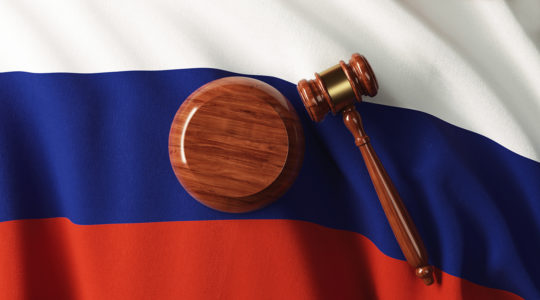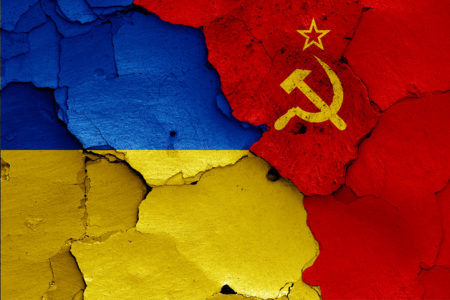Stanford’s Robert Daines on Law Firms and Russian Profits

As the U.S. and NATO allies continue to pressure Putin to halt his illegal invasion of Ukraine, pressure has been mounting for law firms to avoid aiding the Russian war effort—to pull out of Russia and stop working with Russian clients no matter where they are located.
Stanford Law Professor Robert Daines launched the Law Firms and Russian Profits project on March 16 to track and highlight law firm positions on taking on new work for Russian clients or withdrawing from existing engagements. Some law firms are effectively exiting Russian legal work, while others continue to work for large Russian firms and banks.
Here, Daines discusses the project, how sanctions are impacting law firms, and the situation for law firms during this crisis.
Why did you start this project?
I’ve gotten to know some Ukrainian leaders through a Stanford program for emerging leaders and my son recently spent two years in Ukraine and Moldova. I’ve been inspired by their idealism and courage.
I was horrified at the enormous evil of the attacks on civilians, so I was delighted to see how quickly global business withdrew from Russia and undid decades of investment in a few days. People all over the world quickly sent aid—through Airbnb for instance. People everywhere acted quickly.
But the law firm response was comparatively anemic. Firms were slow to close Moscow offices and too often released carefully crafted disclosures without clarity or moral courage. They would sever ties with clients that “did not share their values,” that “contributed to the war effort” or misleadingly implied that the firm had exited Russia, when it in fact continued to work for large Russian banks.
This disappointed me. Global business firms were doing much more. The lawyers I know are people of real principle—why would the profession offer such a pallid response to a seismic shift in the international order and the tragedy in Ukraine? I expected better—and in fact I do expect that things will improve.

So, I decided to try tracking law firm responses. Together, with Ian Ayres at Yale Law School, John Coates at Harvard Law School, and the library research staff, we started collecting firm responses, similar to a Yale SOM site that tracked business exits.
What has surprised you?
I’m surprised how little most law firms have done compared to the global business community. Hundreds of commercial firms walked away. Consulting firms are supporting their Russian employees but forgoing any future profit from working for Russian clients. By contrast, many law firms say only that they won’t work for the government or for sanctioned firms, but leave the door open for other engagements. That’s puzzling. When investment banks leave more quickly and cleanly than law firms, that’s a wake-up call.
Think of the law firms that helped Volkswagen borrow money or I.G. Farben expand globally in the shadow of WWII. I think most people would rather avoid such an engagement today.
How have sanctions impacted law firms doing business with Russian clients? The sanctions are against 10 of Russia’s largest banks and Russian oligarchs, Russian President Vladimir Putin and others in his inner circle. I imagine that’s quite a minefield.
It’s hard to say. It’s difficult to be sure. Client lists are not public and law firms are quiet about the details. But we’ve gotten tips about specific engagements and, when you look carefully, public statements may give the impression that the firm is exiting Russia but in fact leave a carefully constructed loophole.
How do professional responsibility and ethical standards influence law firms and their choices of clients, particularly during war? Does the ABA play a role?
Great question. No one should expect lawyers to immediately stop representing all Russian clients. For example, defending Russians against the Russian government would be laudable and rules of professional conduct limit when a lawyer can withdraw.
But if the law firm is really only working for the client because of ethical rules, the firm can simply promise to donate their fees to Ukrainian relief efforts, as Norton Rose has done. That way it’s clear that ethical obligations—and not greed—are driving the decision.
Finally, ethical rules might also compel withdrawing from a client and nothing stops a firm from trying to withdraw.
But not all legal work in Russia supports the government or touches the war with Ukraine, right?
Of course not.
But any Russian client wealthy enough to hire a big law firm may well be connected to the Kremlin. And serving the interests of these large firms helps the Russian economy and helps to finance the war. The question is whether law firms will forgo profit in order to increase the pressure on the powerful Russian institutions to try and stop the war.

How can law firms help or support Ukraine at this very challenging time?
Some are. They are donating to Ukrainian relief. But the amounts sometimes pale in contrast to the fees they’ve earned. For the past decades, it’s been possible to think that representing Russian firms or the government was a way to building a bridge to democratic values. But Putin has shattered such hopes and broken the international order that has governed since the end of WWII. So, it might make sense for people to go back, tally the fees they’ve earned over the years, and then decide what donations to make to Ukrainian relief.
Second, firms can join the international business community in isolating large Russian companies, whether they are sanctioned or not. Even firms that have no Russian clients can help by pledging not to take on new ones. This would help the law firms who fear that their withdrawal from a current engagement would simply help a rival law firm.
Have you found some firms to be responsive to this historic situation? They are giving up, in some cases, a significant amount of their business, aren’t they? Is this an optimistic point?
Yes. Some are. It can be expensive and difficult to close a Moscow office. And of course, lawyers have a long tradition of being willing to represent the unpopular. But it’s one thing to represent Nuremberg defendants, and it’s another thing to help IG Farben expand in World War II. It makes sense to think about which clients to help.
One optimistic note is the willingness of law students, particularly SLS students, to take a stand—declining a summer job at a firm unwilling to cut ties or circulating a petition to call on law firms to do more. SLS students have been unusual among the top schools for their willingness to speak out.
Robert M. Daines is the Pritzker Professor of Law and Business, Associate Dean, and Senior Faculty for the Rock Center on Corporate Governance at Stanford. He is also Professor of Finance (by courtesy) at the Stanford Graduate School of Business. His research focuses on the intersection between law and finance, including CEO pay, corporate governance, mergers and acquisitions, mandatory disclosure regulations, IPOs, shareholder voting and takeover defenses. Professor Daines’ work has appeared in such top publications as the Journal of Financial Economics, the Journal of Financial and Quantitative Analysis, the Journal of Law, Economics and Organization and The Yale Law Journal. His research has also been covered by The Economist, The New York Times, The Wall Street Journal, Financial Times, Forbes, Fortune and other media.
